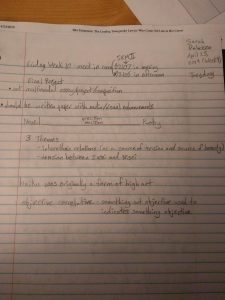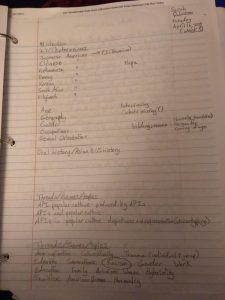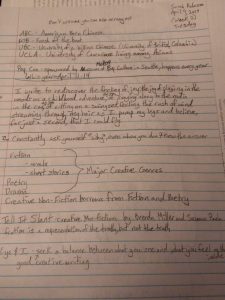
AuthorSarah
I thought this was an interesting and inspiring article. At first glance it seems to be mostly about her experience as a trans woman rather than as a Japanese woman, but then she mentions that she was born in the internment camps and suddenly you can see how it informs both her need for bringing justice and her compassion for marginalized groups such as homeless trans youth as well as other ethnic groups. There was one point in the article that I was a little leery about at first, where she says “I am Muslim, I am a Jew, I’m Black…”, but I think she meant it as a “I relate to their struggles because of my own experiences and I stand by them in the face of adversity” rather than that she is literally part of those groups because she interacted with and assisted members of those groups in the past.
I was surprised when she was describing her experience with coming out as trans to her colleagues and clients, because she says she didn’t have many issues and most people were fine with it. At first I assumed that she must have had people who were awful about it and just wanted to forget or gloss over how bad it was, but I think part of the reason I thought that is because the narrative around coming out as trans always involves lots of resistance and hatred. While such hatred might unfortunately still be common, it isn’t the only reaction possible, and I think it’s important to remember that.
The High-Heeled Shoes: A Memoir
- I had a hard time understanding what was going on at first when the narrator said she saw a man wearing high heels and was so disturbed about it, so I had to reread it to figure out that the man was completely naked and trying to get her to join him. This made a lot more sense, because I was wondering what it had to do with harassment and rape.
- On page 5, she describes all the things she wishes she had said to Tony during his perverted phone call and her analysis of how each response would have sounded. As someone with anxiety and who has been catcalled increasingly often in the past year and a half, this part was very relatable and very accurate to how it feels when you wish you spoke up and defended yourself properly rather than letting it “slide” just because it’s so awkward and startling.
I’ve decided to do my project on representation -and lack thereof- in superhero-related media such as cartoons, comics, and movies. I chose this topic because superhero media extremely popular right now due to things like the Marvel and DC cinematic universes, and that popularity can sometimes obscure problematic themes and ideas that crop up in media and negatively influence our culture.
I plan to explore this topic through examining Asian American representation in Marvel and DC products (including movies, cartoons, and comics). This will potentially include any differences in character backstory between media, such as characters who were whitewashed in an adaptation, characters who were turned into racist caricatures or changed from being racist caricatures to being 3 dimensional characters, etc. I may also look at any racism and related backlash that characters and/or their actors experienced from comic book fandoms.
I know I’m probably going to find a lot of misrepresentation or no representation at all, so I was also considering creating a few “examples” of Asian American characters that are handled more respectfully, but I’m currently unsure of how I would go about doing that for this project.
It kind of bothered me a little bit that the author didn’t actually clearly define affirmative action anywhere that I could see, but I also noticed that it kind of seemed like they were saying that having a disproportionate number of Asian people is bad because there isn’t enough diversity, but having a mostly white people is fine because they’re the majority demographic in America. That part didn’t really make sense to me.
Also, I’d rather admissions people would choose people based on merit rather than saying “We have to have a certain number of these demographics but the rest can be white!”, which is what I think the author is saying seems to happen, which doesn’t seem fair to anybody. My understanding of affirmative action is that it’s meant to prevent admissions people from discriminating against people of color and favoring white people, but it seems like in practice it’s more like the way the author describes, where they’re just meeting a quota and paying lip service to the fact that they’re “diverse”.
Dale Minami
- Talks about how people “aren’t angry anymore’ about racism (in comparison to how things were in the 60s). (pg 11) He says that people today are more focused on empowerment and financial success. (pg 12)I agree that, especially in America, there is a big emphasis on empowerment of individuals and the collective community. However, judging by what I’ve seen and heard, I would argue that people are probably still angry, but are tired and disheartened by the fact that racism and other social issues are still happening after decades; even though America touts itself as this great place of freedom and individuality, there’s still a lot of stigma around being yourself rather than conforming to society, which includes appreciation of other cultures that is not from a pre-approved white male perspective.
- I could do my project on representation (and/or misrepresentation, and/or lack-thereof) in superhero-related media such as cartoons, comics, and movies. This is of interest to me because superheroes have been around for a long time beginning with comic books, so you can see a lot of the attitudes of the times reflected in the media. Since those attitudes often included casual racism, I think it’s important to see how later creators handled race and whether or not those attitudes are still being perpetuated, inadvertently or otherwise. This would also give me an opportunity to look at any Asian-American creators in the superhero genre and how they’re treated.
- I could do my project on Asian Americans who should be famous but aren’t, and/or Asian Americans who are famous but aren’t widely acknowledged as Asian Americans for whatever reason. This topic would be of interest to me because there’s a lot of people, such as famous actors, that I had no idea what their ethnicity was and was surprised to find out that they weren’t white like I assumed. This would also presumably give me a chance to examine why assuming the default ethnicity of pale skinned people is white is a problem.
- I could do my project on how Asian media such as video games and anime has influenced American culture and whether or not that has inspired more Asian Americans to become content creators. This is of interest to me because I know there are a lot of video games and anime that are still really popular and have been for decades, such as the Pokemon and Dragon Ball franchises, and it would be interesting to see how that kind of media has shaped my generation’s attitudes and preferences for content.
It starts with a steady heartbeat. Then a harp and keyboard introduce themselves softly in the background, leading into the singer’s voice entrancing listeners with its ethereal qualities. Then the chorus hits and she comes to life, emotion evident in the power of her voice. Florence and the Machine’s song Cosmic Love begins, appropriately, with the narrator falling in love. “A falling star fell from your heart and landed in my eyes. I screamed aloud, as it tore through them, and now it’s left me blind.” The “falling star” is the love she feels for the other person and it’s blinded her with the intensity of its metaphorical light. This love is so powerful and overwhelming that no other can compare, hence the lyrics “The stars, the moon, they have all been blown out. You left me in the dark. No dawn, no day, I’m always in this twilight. In the shadow of your heart.” These lyrics are fittingly sung in a way that feels like the singer is screaming with the intensity of her feelings despite still being melodic and ethereal. The drums in the background gives this an orchestral, dramatic quality, made even more emotional by beating to a similar rhythm as a heartbeat. The narrator then becomes quiet and soft once again, preparing herself for disappointment, or perhaps for the feelings to fade unresolved, with the lyrics “I took the stars from our eyes, and then I made a map. And knew that somehow I could find my way back.” But then she seems to realize that her feelings are reciprocated, and the person she’s in love with is just as blinded by love for her as she is for them, as she softly sings “Then I heard your heart beating, you were in the darkness too. So I stayed in the darkness with you.” This leads into the chorus again, but with the new context it feels less despairing and more triumphant, as though saying yes, she was in the darkness caused by the blindness of love, and it was wonderful.
This song is incredibly powerful and thick with emotion. As a child, I had no friends for over a decade. It wasn’t until high school that I was able to make any kind of connection to other people, and even then it almost never lasted. On those rare occasions that the friendship lasted, it was because they clung just as tightly to me as I did to them. To me this song is an excellent representation of the way it feels to shed those feelings of loneliness and hold tight to a relationship, especially when you aren’t sure if the other person even cares about you the way you care about them. For someone who has troubles with keeping friendships, those feelings of uncertainty can be pervasive and ultimately poison the relationship with one or both people’s insecurities. Cosmic Love evokes the feeling of uncertainty that can be typical of starting a new relationship, whether platonic or romantic, while still demonstrating the feelings of love that make us want to take the risk in the first place.
© 2025 Sarah's A-POP Blog
Theme by Anders Norén — Up ↑

